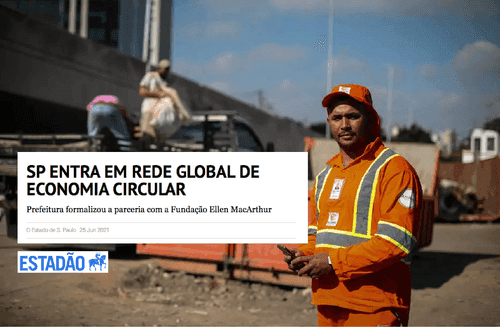
25/06/2021
Estadão: SP in a global circular economy network
Content translated by Google Translate
The city of São Paulo formalized a partnership with the Ellen MacArthur Foundation and is now part of the global circular economy network. Cool huh? Check out the details in the article published this Friday (25) by Estado de S. Paulo:
Daniel de Oliveira starts early. Usually, around 5:45 am he is already at the Ecoponto Berrini, where he works from 6 am to 2 pm as an assistant in various services. “It's my second home, I really appreciate it,” says the resident of Jardim Ângela, in the south of São Paulo, who says he gets along well with his work partner and with the residents who pass by the Ecoponto.
Employee for a year and three months at a company that provides services to the City Hall, Daniel organizes daily the collection of various types of disposal, such as rubble, old furniture and, since the beginning of this month, plaster. Afterwards, trucks look for this material and there will be an effort to put it to new use. The novelty was implemented by the Municipal Authority for Urban Cleaning (Amlurb) in 36 Ecopoint units and should be expanded soon. As well as other initiatives.
In the search for a greener future, the City Government formalized a strategic partnership with the Ellen MacArthur Foundation in April and became the first city in the world admitted by the worldwide circular economy network – a group that already included global companies and philanthropic organizations in settled actions in reduction, reuse, recovery and recycling of materials and energy. The expectation is that, by working on actions locally, São Paulo will consolidate itself as a reference place for the circular economy in Brazil and Latin America, inspiring other cities. “It is an honor and a great responsibility for São Paulo to be the first city in the world recognized as a strategic partner of the Ellen MacArthur Foundation, followed by New York and London”, says the former mayor and current municipal secretary for International Relations, Marta Suplicy.
For the professor at the São Carlos School of Engineering at the University of São Paulo (USP) and coordinator of the Circular Economy Research Center at Inova USP, Aldo Roberto Ometto, this integration is “very positive” – especially if the circular economy actions are endowed with a social character and assume sustainability as a consequence. “The great opportunity for the circular economy in Brazil is the social innovation it can bring when more vulnerable actors are included in circular chains”, he highlights.
Ranking - The circularity index of the city of São Paulo, which concerns the recovery capacity of collected materials, is 0.84%, according to 2019 data compiled by the finance professor at the Faculty of Economics, Administration and Accounting of Ribeirão Preto (FEA-USP) and researcher in impact assessment and public policy Perla Rebehy. In the selection of Brazilian cities with more than 1 million inhabitants, the capital of São Paulo is in 8th place – São Luís leads with 5.57%.


